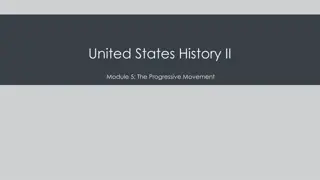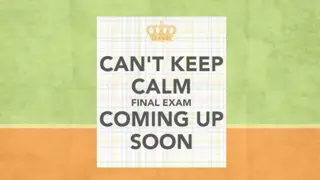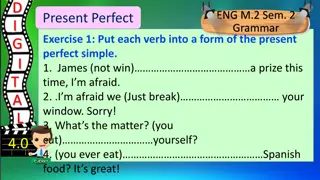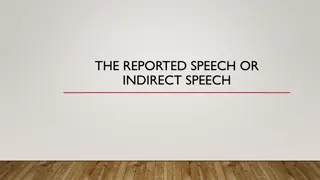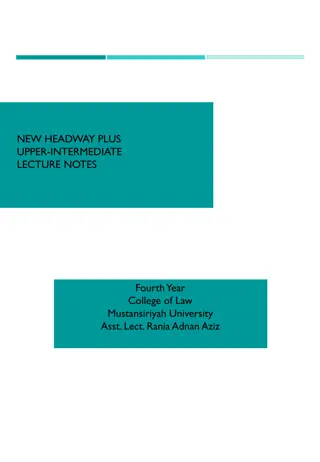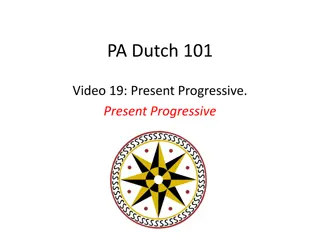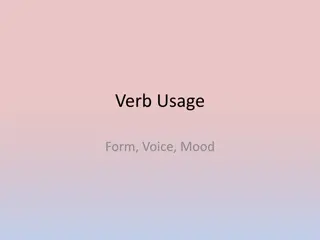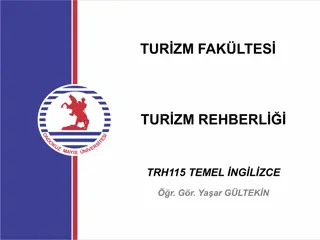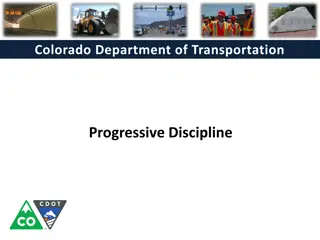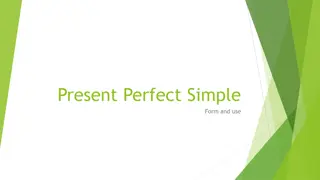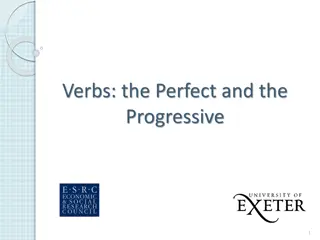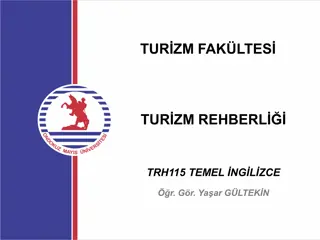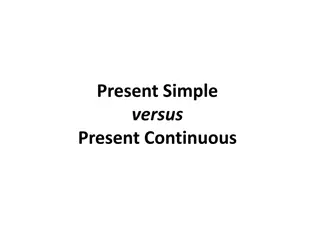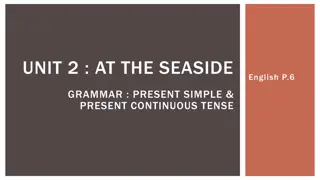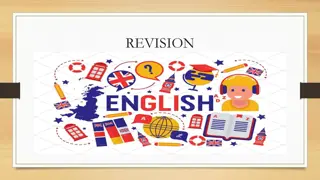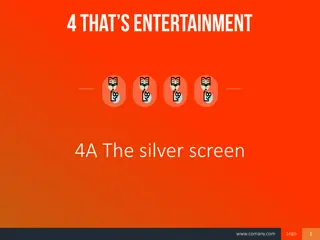
Present Perfect Tense in English Grammar
Learn about the present perfect tense in English grammar, including its usage to discuss experiences, changes, and continuing situations. Explore examples and common adverbs used with the present perfect tense.
Download Presentation

Please find below an Image/Link to download the presentation.
The content on the website is provided AS IS for your information and personal use only. It may not be sold, licensed, or shared on other websites without obtaining consent from the author. If you encounter any issues during the download, it is possible that the publisher has removed the file from their server.
You are allowed to download the files provided on this website for personal or commercial use, subject to the condition that they are used lawfully. All files are the property of their respective owners.
The content on the website is provided AS IS for your information and personal use only. It may not be sold, licensed, or shared on other websites without obtaining consent from the author.
E N D
Presentation Transcript
Present Perfect Simple With the present perfect tense, there is always a connection with the past and with the present. We use the present perfect to talk about: Experience Change Continuing situation The exact time of the event is unspecified. The adverbs ever, never, yet, still, already, and lately are often used with the present perfect. - Have Have you ever seen - No, I haven t. I ve seen snow? ve never seen seen snow Event = seeing snow. Time Frame = from the beginning of their lives up to now. now X X X X time?
Present Perfect Simple - Have Have you finished his. Event = doing homework Time Frame = from the time they started up to this moment. finished your homework, yet? I still haven t finished haven t finished mine. Jack has has already finished finished Use of the present perfect with just or recently emphasizes that an action has recently been completed completed. emphasizes that an action has recently been - Sara has - Sara has - Sara has has recently finished has just finished finished her work. has finished finished her work. finished her work. X X X X just now Event = doing work Time Frame = a recent time in the past Sometimes just or recently is implied by use of the present perfect.
Present Perfect Simple Ever Ever Ever Ever usually means at any time The opposite, meaning at no time Ever Ever is mainly used in questions with (not ever not ever) as an alternative to never at any time and can be used to refer to past, present and future situations. at no time, is never never. questions with the present perfect the present perfect. Sometimes it is used in negative never. negative sentences - Have you ever - I never want to see him again ever been to Rome? I don't ever want to see him again. When you make a superlative statement, for example when you want to say that something is the best, you can use ever ever. - Rome is the most beautiful city I ve ever ever been to in the world!
Present Perfect Simple Present Perfect for experience We often use the Present Perfect to talk about experience from the past. We are not interested in when you did something. We only want to know if you did it: I I have seen have seen an alien. They They have lived have lived in Bangkok. Have Have you you been been there? We We have have never never eaten an alien. in Bangkok. there? eaten caviar. caviar. The action (or state) was in the past In my head I have a memory now Connection with past: the event was in the past Connection with present: in my head, now, I have a memory of the event; I know something about the event; I have experience of it.
Present Perfect Simple Present Perfect for Present Perfect for change change We also use the Present Perfect to talk about a change, or new information: I have bought a car I have bought a car Last week I didn't have a car Now I have a car John has broken his leg John has broken his leg Yesterday John had a good leg Now he has a bad leg Has the price gone up? Has the price gone up? Was the price $1.50 yesterday? Is the price $1.70 today? The police have arrested the killer The police have arrested the killer Yesterday the killer was free Now he is in prison Connection with past: the past is the opposite of the present Connection with present: the present is the opposite of the past Americans do use the present perfect but less than British speakers. Americans often use the simple past instead. An American might say: Did you have lunch? , where a British person would say: Have you had lunch?"
Present Perfect Simple Present Perfect for Present Perfect for continuing continuing situation situation We often use the Present Perfect to talk about a continuing situation the past past and continues in the present present (and will probably continue into the future). This is a situation situation (not an action). We usually use for for or since since with this structure. continuing situation. This is a state that started in I I have worked have worked here since June. here since June. He He has been has been ill for 2 days. ill for 2 days. How long How long have have you you known known Tara (for)? Tara (for)? The situation started in the past. It continues up to now. (It will probably continue into the future.) Connection Connection with past: Connection with present: Connection with present: the situation continues in the present. with past: the situation started in the past.
Present Perfect Simple The present perfect can also express an event that has occurred repeatedly from a point in the past up to the present time. The event may happen again. - We ve had ve had three tests so far this term. Repeated event = taking tests Time Frame = from the beginning of the term up to now X X - I ve ve met met many people since I came here. X X X X X X Beginning of term now Arriving here Repeated event = meeting people Time frame = from the time I came here up to now
Present Perfect Simple For For or since since? ? We use for with a period of time in the past, present or future. We use since with a point in time in the past. He lived in Oxford for 3 years and then he moved (completed past completed past). They ve lived in Oxford for a couple of months (began in the past and continues into the present in the past and continues into the present). began For For refers to periods of time, e.g. 3 years, 4 hours, ages, a long time, months, years. We re going to stay in Oxford for three days and then we re going to London for a day (future plans future plans). They ve lived in Oxford since 2004. Since Since refers to a previous point in time. For For can be used with all tenses. Since clause). Since is usually used with perfect tenses* only (in the main
Present Perfect Simple * *Perfect Perfect Tenses Tenses The three perfect word perfect literally means "made complete" or "completely done"). perfect tenses tenses in English are the three verb tenses which show action already completed. (The They are formed by the appropriate tense of the verb to to have have plus the past past participle participle of the verb. Present Present Perfect: (Present tense of to have plus participle. Action is completed with respect to the present). Perfect: I have seen it. Past Past Perfect: Perfect: I had seen it. (Past tense of to have plus participle. Action is completed with respect to the past). Future Perfect: Future Perfect: I will have seen it. (Future tense of to have plus participle. Action is completed with respect to the future).
Present Perfect Progressive Present Present Perfect Progressive Perfect Progressive WE HAVE BEEN SINGING Auxiliary HAVE in present tense Auxiliary BE in past participle form Main verb SING in present participle form (-ing) SUBJECT
Present Perfect Progressive The Present Present Perfect Perfect Progressive Progressive is used when there is usually a connection with the present present. We use the present perfect progressive to talk about: past action recently stopped past action still continuing Action that started in the past and stopped recently. There is usually a result now now: I'm tired[now]because I've been running Why is the grass wet[now]? Has You don't understand[now]because you have 've been running. Has it been raining been raining? haven't been listening been listening.
Present Perfect Progressive Action that started in the past and is continuing now now. This is often used with for for or since since: I have been reading for have been reading for 2 hours. (I am still reading now). We've been studying since 've been studying since 9 o'clock. (We're still studying now). How long have have you been learning been learning English? (You are still learning now). We have have not been smoking been smoking. (And we are not smoking now). He has been has been waiting waiting here since 9am. (He s still waiting). He has been working has been working since he arrived. (He s still working right now). I ve been living ve been living in New York since my childhood. (I ve never lived anywhere else, I m still living here). From that that time to the present
Present Perfect Simple VS. Present Perfect Progressive We use both of these tenses for finished and unfinished actions. We use both of these tenses for finished and unfinished actions. The present perfect simple actions that started in the past and are still true in the present. It's often used with stative verbs simple can be used (often with 'since since' and 'for for') to talk about unfinished unfinished stative verbs: I've known John for three years. The present perfect progressive unfinished actions that started in the past and are still true in the present. However, we don't use don't use the present perfect progressive with stative verbs: progressive can also be used (often with 'since since' and 'for for') to talk about She's been living here for three years.
Present Perfect Simple VS. Present Perfect Progressive Sometimes there's really no difference in meaning between the two tenses Sometimes there's really no difference in meaning between the two tenses. This is especially the case with verbs such as 'live', 'work' and 'study': They've lived in London since 2004. They've been living in London since 2004. I've studied French for ten years. I've been studying French for ten years. He's worked at the company since 2009. He's been working at our company since 2009.
Present Perfect Simple VS. Present Perfect Progressive Sometimes, there is a difference in Sometimes, there is a difference in meaning: meaning: The present perfect progressive The present perfect simple progressive can be used to emphasize the length of time that has passed. simple is generally neutral: They've been waiting for hours! (This emphasizes the length of time). They've waited for hours. (This doesn't doesn't emphasize the length of time). On the other hand, the present perfect simple how many. This isn't possible with the present perfect progressive simple is often used when we're talking about how much or progressive: She has drunk three cups of coffee this morning. She has drunk at least a liter of coffee today. (NOT: She has been drinking three cups of coffee this morning).
Present Perfect Simple VS. Present Perfect Progressive The present perfect progressive simple simple focuses on the fact that the action is completed on the fact that the action is completed: progressive often focuses on the action itself on the action itself, while the present perfect I've been reading the book you recommended. (I'm enjoying it, but I'm not finished). I've read the book you recommended. (I've finished it, so we can talk about it). This difference is often used to talk about different kinds of results in the present. The present perfect simple simple is used when the action is finished, and the result comes from the action being finished finished: the result comes from the action being I've eaten dinner, so let's go out. She's done all her homework, so she can relax this evening. I've made a cake. Would you like some?
Present Perfect Simple VS. Present Perfect Progressive The present perfect progressive It doesn't matter if the whole action is finished or not. The result is often something we can see, hear, smell, or feel: progressive is used when the result comes from the action itself when the result comes from the action itself. I've been eating dinner, so there are plates all over the table. She's been doing her homework, so she's tired. I've been making a cake, that's why the kitchen is such a mess. Finally, the present perfect progressive temporary: progressive can be used to emphasize emphasize that something is She's been running a lot recently. (She doesn't usually do this). Usually I study at home, but I've been studying in the library for the past few weeks.
Exercises Complete the sentences below by putting the verb in brackets into the present perfect simple perfect perfect progressive progressive. present perfect simple or present present 1. 1. The company is huge. It (create) _____________ a thousand new jobs since the beginning of last year. 2. 2. We (produce) _____________ this product since the beginning of the year. 3. 3. I (have) _______________ this car for twenty years and it's as reliable as ever. 4. 4. I'm afraid the company is going bankrupt. It (have) ______________ big problems lately. 5. 5. So, what (you/do) _______________ since I last saw you? What's new? 6. 6. How many of these questions (you/manage) ________________ to get right so far? 7. 7. I'm a bit worried about Malcolm. He (act) _______________ very strange lately. 8. 8. He's an awful driver. He (have) __________________ four accidents in the last three months. 9. 9. (you/send) _________________ us the new price list of your products yet? We need it as soon as possible. 10. 10. I (try) ________________ to repair the lock on our door for the last four hours without any success.
Exercises 1. 1. I (write) _________________ twenty emails so far today. 2. 2. I (write) ____________________ emails all day. I'm exhausted. 3. 3. I (only/live) ____________ in the area for a month. I don't know anyone yet. 4. 4. John's disappeared. Does anyone know what (happen) ________________ to him? 5. 5. Have you heard? Tom (break) ______________ his leg. 6. 6. I (try) _______________ to call you all day. Why didn't you answer the phone? 7. 7. Why are you out of breath? (you/run) _________________ ? 8. 8. My aunt is ill again. She (be) _______________ in hospital five times in the last two years. 9. 9. You're soaking wet. How long (you/stand) ______________ here? 10. 10. Who (eat) __________________ my biscuits? Half the packet is gone!
Exercises 1. 1. I (lose) _____________ my car keys. 2. 2. Robert (break) ______________ his leg. 3. 3. Her eyes are all red. Yes, she (cry) _______________. 4. 4. I m afraid I have some bad news: your uncle (die) ______________. 5. 5. Expect long delays on the motorway: a truck (overturn) ______________ and two lanes are blocked. 6. 6. Why is your hair wet? (wash, you) _________________? 7. 7. Why are you out of breath? Because I (just run) _________________ up the stairs from the bottom floor. 8. 8. Why are you out of breath? Because I (run) ________________. 9. 9. Watch out, the grass is slippery, (it, rain) _______________.
Exercises 1. ___________________ (you / buy) your train ticket yet? 2. The kitchen is a complete mess! What ___________________ (the children / do)? 3. Julie ___________________ (learn) to drive for six years! 4. Amanda ___________________ (already / have) lunch, so she ll meet us later. 5. How much coffee ___________________ (she / drink) this morning? 6. Simon ___________________ (write) three books. 7. I ___________________ (do) everything I needed to do today! Hurray! 8. It ___________________ (not / rain) all summer, so the garden is dead. 9. I ___________________ (read) your book. Here it is, thank you. 10. She ___________________ (forget) how to get to my house.
Exercises 11. I ___________________ (work) in the garden all day and I need a rest. 12. She ___________________ (make) three cakes. They look delicious! 13. David feels great these days. He ___________________ (get) up early lately. 14. We ___________________ (always / hate) rush hour traffic. 15. Recently, I ___________________ (study) a lot. My exams are in a few weeks. 16. We ___________________ (write) this book for months and months. 17. I ___________________ (always / love) chocolate. 18. I ___________________ (want) to go back to university for a long time. 19. What s that delicious smell? ___________________ (you / cook)? 20. I ___________________ (watch) seven films this week!
Exercises 1. I ___________________ (not / do) the housework yet. 2. They ___________________ (study) very hard recently. 3. She ___________________ (promise) to help many times. 4. He ___________________ (clean) the kitchen. Everything is sparkling clean. 5. She ___________________ (write) her essay and ___________________ (send) it to her professor. 6. He ___________________ (see) the film The King s Speech about six times. 7. We ___________________ (paint) our living room. I think it looks a lot better. 8. She ___________________ (take) French lessons lately. 9. It ___________________ (not / rain) for three hours! Only about one hour. 10. Lucy ___________________ (already / leave).
Exercises 11. How many times ___________________ (you / visit) Scotland? 12. I ___________________ (call) John for hours and hours and he hasn t answered. I m really angry with him! 13. I ___________________ (be) in London for three years. 14. We ___________________ (know) James for ages. 15. It s really smelly in here. ___________________ (somebody / smoke)? 16. How much bread ___________________ (she / buy)? 17. She ___________________ (eat) chocolate all morning, so she feels sick. 18. I ___________________ (paint) my house all day, but it s not finished yet. 19. Julie ___________________ (be) at the office since 6 am. 20. The writer ___________________ (deserve) this award for a long time.
Reading A Risky Combination: the young person s brain and the lure of viral A Risky Combination: the young person s brain and the lure of viral challenges challenges Love them or hate them, viral challenges have been all over social media in recent years. These online dares are often harmless fun. Take the Ice Bucket challenge, which involved people throwing buckets of ice water over their heads in the name of charity. Some viral challenges, however, are less innocuous. The Laundry Pod challenge encouraged participants to eat (yes, eat eat) a capsule of laundry detergent. This landed dozens of people in the emergency room. In another challenge, people imitated events in the popular film Bird Box, by doing everyday activities blindfolded. Predictably, this resulted in injuries and at least one auto accident. In the wake of these incidents, social media companies decided that they had a responsibility to keep users from harm and banned dangerous challenges. However, the popularity of these challenges begs the question: what made them so alluring in the first place? The answer could be human nature. Or, in particular, young Viral challenge participants are usually between 13 and 25 years old. This is no surprise. The key component of these videos is often risk, and some evidence suggests that young brains are predisposed to taking risks. Various neuroscientific studies have found that teens and young adults may be hardwired to make poor judgment calls. This trait simply reflects their stage of cognitive development. young human nature.
Reading The pre-frontal cortex of the brain plays an important role in the inhibition of risk-taking behavior. This area analyzes potential risk and gives the all-clear to proceed with action. However, the pre-frontal cortex does not fully develop until the age of 25, meaning that young people do not have the same capacity as adults when it comes to analyzing risk. Furthermore, research suggests that most young people have a reward sensitive to the rewards associated with a goal or challenge than adults are. The bragging rights, the kudos, and the likes that can be gained for completing such daredevil antics seem to outweigh the dangers for many young people. Of all the benefits of social media, the chance of social recognition is seen as particularly attractive. Beyond the science, there may be other elements involved in making viral challenges popular. One is a fear of missing out on the latest trends. Many young people are constantly connected to social media. Disconnecting can cause anxiety and a feeling that they might miss out something important. Some studies report that this social anxiety is one of the main causes of social media addiction among young people. Their constant online presence means more exposure to viral challenges and perhaps a stronger desire to participate. Whether the main factor compelling young people to take part in these challenges is social or cognitive, findings suggest that it is inherent. They have a built-in tendency towards risk-taking, and risky viral challenges merely add fuel to the fire. reward- -seeking seeking brain. That is, they are more

